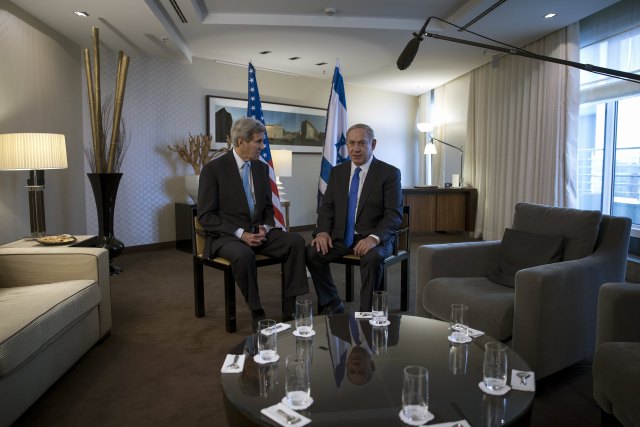
U.S. Secretary of State John Kerry and Israeli Prime Minister Benjamin Netanyahu called Thursday for an immediate end to incitement blamed for a recent deadly wave of Palestinian attacks against Israelis.
Meeting in Berlin as Kerry waded into the volatile mix of spiraling tensions in a bid to de-escalate the situation, the pair condemned the attacks. Kerry called for an end to all incitement and all violence but Netanyahu pointedly repeated earlier direct accusations that Palestinian President Mahmoud Abbas is to blame, saying he is “spreading lies” about Israel and the status of the holy site at the center of the tensions.
“There is no question this wave of attacks is driven directly by incitement, incitement by Hamas, incitement from the Islamist movement in Israel and incitement, I am sorry to say, from President Abbas and the Palestinian Authority,” Netanyahu said. “I think it is time for the international community to say clearly to President Abbas to stop spreading lies about Israel. Lies that Israel wants to change the status quo at the Temple Mount, lies that Israel wants to tear down the Al-Aqsa Mosque, lies that Israel is executing Palestinians. All of that is false.”
He said Israel is committed to keeping the status quo at the site, which is known to Jews as the Temple Mount, the holiest site in Judaism and home to the biblical Temples. For Muslims, it is the Noble Sanctuary, home to the Al-Aqsa Mosque, the third-holiest site in Islam and a key national symbol for the Palestinians. The site, captured by Israel from Jordan in the 1967 Mideast war, is a frequent flashpoint of violence.
The Palestinians accuse Israel of trying to change the longstanding “status quo” at the site, which allows Jews to visit but not to pray. They point to a growing number of Jewish visitors who seek an expanded Jewish presence and prayer rights at the site.
Netanyahu rejected those claims and said ending incitement was the only way to ease tensions.
“To generate hope, we have to stop the terrorism,” he said. “To stop the terrorism, we have to stop the incitement and I think it’s time the international community told Pres Abbas to stop the incitement and hold him accountable for his words and his deeds.”
Kerry was more circumspect and did not single out Abbas for blame.
“We have to stop the incitement, we have to stop the violence,” he said, adding that he had spoken to Abbas and Jordan’s King Abdullah, who is charged with overseeing the Jerusalem site, in the past day and both assured them of their commitment to calm.
“I believe people want this to de-escalate,” he said of Abbas and Abdullah, whom he will meet on Saturday in Amman.
Kerry added that these conversations would be “very important to settle on the steps that can be taken beyond the condemnation and beyond the rhetoric” to end the violence.
Kerry has said he wants clarity about the status quo about the site, but officials say he doesn’t believe that needs to be in writing.
With only a general outline of goals in these discussions, Kerry arrived here intending to listen as much as talk, as he steers attempts to restore relative calm in Israel and the Palestinian territories.
After Kerry meets Netanyahu he will see German Foreign Minister Frank-Walter Steinmeier and European Union foreign policy chief Federica Mogherini, and then travel to Vienna, where he will meet the foreign ministers of Russia, Turkey and Saudi Arabia about Syria on Friday. He will then visit Amman, where he will see Abdullah in addition to his talks with Abbas. He plans to wrap up the trip in Saudi Arabia.
Complicating his already delicate tasks, the situations in both hotspots have taken recent unexpected and potentially dangerous turns. Netanyahu blamed a former Palestinian leader for inspiring Hitler’s Holocaust and new Palestinian stabbing attacks on Israelis have threatened to further inflame the combustible atmosphere.
U.S. officials have yet to detail any American plan to end the Israeli-Palestinian unrest that erupted a month ago over Jerusalem’s most sensitive holy site. During that time, 10 Israelis have been killed by Palestinian assailants, mostly in knife attacks, while 47 Palestinians — including 26 labeled by Israel as attackers — have been killed by Israeli fire. The remainder died in clashes between Israeli forces and Palestinian protesters. In addition, an Israeli mob killed an Eritrean migrant after mistaking him for an Arab attacker.









































